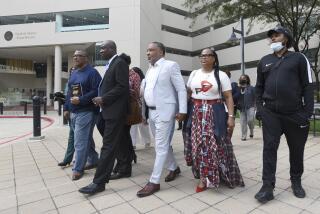Trial Over Rights to Herceptin Nears End
- Share via
Two of the nation’s largest biotechnology companies, Genentech Inc. and Chiron Corp., are locked in a dispute over rights to one of Genentech’s most successful products, the breast cancer drug Herceptin.
Chiron is suing Genentech in federal court, claiming it holds a critical patent on the technology behind Herceptin. The stakes are huge. Chiron is asking for as much as 30% of Herceptin sales until its patent expires in 2005. That could total more than $300 million.
The trial, which began Aug. 6 in Sacramento, is expected to go to the 10-member jury this week. If the jury finds that South San Francisco-based Genentech willfully violated Emeryville, Calif.-based Chiron’s patent, it can triple damages.
The case underscores the importance of patents in the biotechnology industry. San Diego patent lawyer James McClain said biotech companies often depend on one or two drugs that take many years and millions of dollars to develop. Patents give biotech companies a monopoly that protects such enormous investments.
Given the stakes, companies often choose to battle in court rather than agree to share intellectual property rights, he said.
“No side can afford to lose valuable rights to an invention,” McClain said.
For Genentech, the suit is the second in as many months to question the company’s business tactics.
Genentech is appealing a $500-million judgment against it by a jury that found it cheated City of Hope National Medical Center in Duarte out of royalties. That verdict was reached in June.
The dispute between Genentech and Chiron is rooted in a scientific race during the 1980s to discover the molecular cause of breast cancer. In 1984, David B. Ring and Arthur F. Frankel, then scientists at Cetus Corp., developed a mouse antibody that targeted a protein associated with human breast cancer. Chiron acquired Cetus in 1991.
Chiron did not develop a drug based on the development. But it diligently pursued a patent for it. The patent was issued in 2000.
U.S. District Judge William B. Shubb ruled in pretrial proceedings that Genentech infringed Chiron’s patent. Jurors must decide whether Chiron’s patent is valid.
Genentech claims that the Chiron patent is invalid because the discovery it covers is not useful or well described, two important tests. Chiron’s mouse antibody, if used in people, would be destroyed by the immune system as a foreign invader before it could attack cancer cells, Genentech said.
Beyond that, Genentech said Cetus’ 1984 patent application does not identify the human breast cancer protein as Her-2. Chiron amended its application to mention the term Her-2 in 1995, the same year Genentech scientists described Her-2 in a paper published in Science.
Genentech said Herceptin, an antibody that is part human, part mouse, was invented by Genentech scientist Axel Ullrich and UCLA scientist Dennis Slamon. It works by blocking a protein found in 30% of breast cancers. Hailed as a breakthrough while still in development, it galvanized an activist movement of breast cancer patients demanding access to the experimental drug. Herceptin launched in 1998.
Genentech spokeswoman Sabrina Johnson said Genentech did not draw on work by Chiron.
“We developed a cancer-fighting treatment entirely independently of what they did,” she said. “We think Chiron’s claims are a bit questionable.”
But Chiron attorney Nancy Koch said it was no secret that scientists from Cetus were working on a breast cancer antibody. The Cetus scientists published some of their findings, making them available to others.
Chiron said Genentech improved the Chiron antibody but did not invent it any more than improvements in telecommunications dislodge Alexander Graham Bell as the inventor of the telephone.
“The bottom line is that without our invention, their drug does not work,” Koch said.
Any verdict is likely to face an appeal that will drag the dispute on for years. And Chiron has filed a second Herceptin suit against Genentech involving another patent. That case should go to trial next year.
The Patent and Trademark Office, meanwhile, is reviewing a challenge to Chiron’s patent from Genentech.
Genentech told the patent office that two scientists from the University of Pennsylvania, Jeffrey A. Drebin and Mark Greene, discovered the breast cancer antibody before Ring and Frankel. The university filed a patent application in the research in 1985, but no patent was issued.
The challenge, known as an interference proceeding, could take several years to resolve, and there is no way to predict the outcome.
However, a judge in the federal patent suit ruled that the Drebin-Greene intellectual property was not relevant because it dealt specifically with rat antibodies and rat breast cancer tumors.
Judge Gregory G. Hollows, in a written decision, noted Genentech paid the University of Pennsylvania millions for intellectual property rights two years after Herceptin launched. He suggested that the deal was little more than a legal maneuver.
“Unless Genentech is now in the business of saving our rodent cousins from breast cancer,” he wrote, one can infer that Genentech licensed the university’s intellectual property to “attack with impunity Chiron’s patents.”
More to Read
Inside the business of entertainment
The Wide Shot brings you news, analysis and insights on everything from streaming wars to production — and what it all means for the future.
You may occasionally receive promotional content from the Los Angeles Times.










